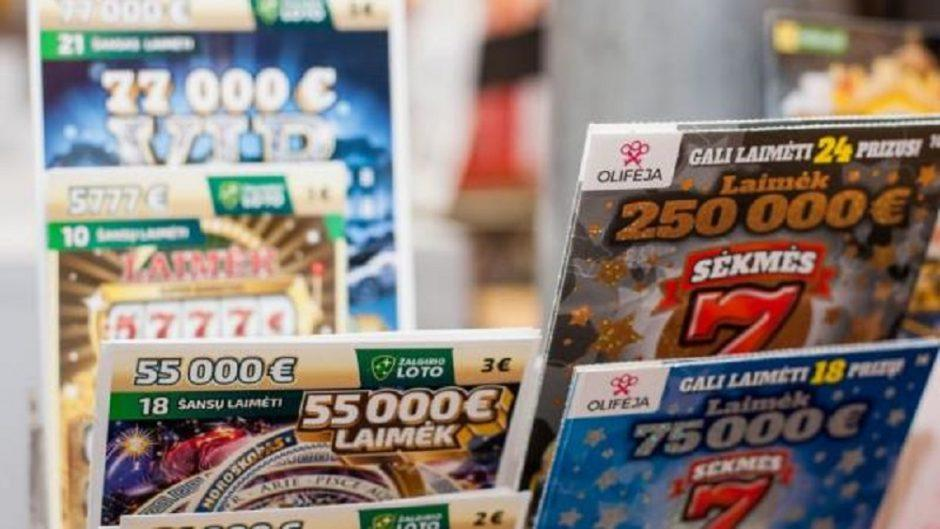Lithuania Approves New Tax Regime on Lottery Sales to Fund Olympic Sports
Posted on: November 5, 2021, 10:23h.
Last updated on: November 5, 2021, 10:35h.
Lithuania’s government has approved a new bill that may not make a lot of people happy. Starting next year, licensed lottery operators and agents must include a 13% tax on every ticket they sell.

The funds from the tax will fund national sporting organizations and athletes’ development.
The change is almost purely cosmetic, which means lottery players shouldn’t see any changes. The change will instead affect lottery vendors.
Seimas, Lithuania’s parliament, made the update to Lithuania’s Gambling Tax and Lottery rules. The result alters the 8% budget allocation and the 5% tax to become a flat 13% tax, according to English-language Lithuanian media outlet LRT.
However, lottery vendors have time to implement the changes. The new law won’t go into effect until July of next year
Seimas Stands Up for Sports
Seimas is introducing the changes in the run-up to the World Championships in 2022 and the Olympics in 2024. The Lithuanian National Olympic Committee and the Lithuanian Paralympic Committee will be funded directly from the new funds given to the government. Lottery organizers will only see administrative changes linked to their operations.
Next year, lottery ticket vendors in Lithuania will pay a flat 15% tax on ticket sales. That’s instead of giving up 5% in the way of tax to the government and 8% of their revenue to sports organizations.
The change is expected to go a long way toward providing more support for Lithuania’s sports scene. Current estimates show that Lithuanian sports will receive €20.9 million (US $24.1 million) in funding in 2022. However, with the tax changes, Seimas believes the figure will jump by “several million.”
Olifeja, Lithuania’s National Lottery operator, currently has a five-year contract with Scientific Games (SG) for instant tickets printing. This contract includes the option of an additional two years.
According to its published data, Olifeja’s instant-game retail sales topped €56 million (US $64.7 million) in 2019. Initially, the deal with SG saw Olifeja, which also operates terminal-based lottery games, increase its instant-game retail sales by more than 5,000%. However, because of COVID-19, Olifeja lost 6.7% in sales in 2020 compared to 2019.
Seimas Continues Rewriting the Tax Book
This isn’t the first time in recent history that Seimas has been looking at changes to how gaming taxes are handled in the state.
Last month, a bill was introduced that would make land-based casinos begin to pay taxes based on their gross gaming revenue (GGR). That’s instead of paying a flat fee for every gaming table or machine they operated. Other forms of gambling in the country already pay based on their GGR.
Under the old format, casinos paid €260 (US $300.51) for every Category A slot machine, €130 (US $150) for every Category B machine and €2,300 (US $2,658) for every gaming table. The new law would enforce an 18% tax on gross revenue, and was drafted in order to bring the land-based gambling segment in line with the others. The law is still under review.
Related News Articles
Alabama Daily Fantasy Sports Bill Throttled to Death on Senate Floor
Lottoland Denounces Australia’s Bill to Ban Secondary Lotteries
Mississippi Lottery Commences Operations, Only Five Non-Lottery States Remain
Most Popular
This Pizza & Wings Costs $653 at Allegiant VIP Box in Vegas!
Sphere Threat Prompts Dolan to End Oak View Agreement
MGM Springfield Casino Evacuated Following Weekend Blaze
Fairfax County Officials Say No NoVA Casino in Affluent Northern Virginia
Most Commented
-
VEGAS MYTHS RE-BUSTED: Casinos Pump in Extra Oxygen
— November 15, 2024 — 4 Comments -
VEGAS MYTHS RE-BUSTED: The Final Resting Place of Whiskey Pete
— October 25, 2024 — 3 Comments
















No comments yet